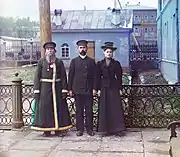First Deputy Premier of the Soviet Union
The First Deputy Premier of the Soviet Union was the deputy head of government of the Union of Soviet Socialist Republics (USSR); despite the title, the office was not necessarily held by a single individual. The office had three different names throughout its existence: First Deputy Chairman of the Council of People's Commissars (1923–1946), First Deputy Chairman of the Council of Ministers (1946–1991) and First Deputy Prime Minister of the Soviet Union (1991). The term first deputy premier was used by outside commentators to describe the office of first deputy head of government.
| First Deputy Premier of the Soviet Union Первый заместитель Председателя Совета Народных Комиссаров СССР | |
|---|---|
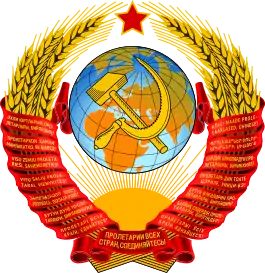 | |
| Type | Deputy head of government |
| Reports to | The Premier |
| Formation | 14 May 1934 |
| First holder | Valerian Kuybyshev |
| Final holder | Vladimir Shcherbakov |
| Abolished | 26 November 1991 |
| Succession | First Deputy Prime Minister of Russia |
| This article is part of a series on the |
| Politics of the Soviet Union |
|---|
 |
A First Deputy Premier was responsible over a specific policy area. For example, Kirill Mazurov was responsible for industry, while Dmitry Polyansky was accorded agriculture.[1]:34 In addition, an officeholder would be responsible for coordinating the activities of ministries, state committees and other bodies subordinated to the government. It was expected that a First Deputy gave these organs guidance in an expeditious manner to ensure the implementation of plans for economic and social development and to check if the orders and decisions of the government were being followed. If the premier could not perform his duties one of the first deputies would take on the role of acting premier until the premier's return.[2] During the late 1970s, when the health of Premier Alexei Kosygin deteriorated, Nikolai Tikhonov as first deputy acted on his behalf during his absence.[3] At last, a first deputy was by right a member of the government Presidium, its highest decision-making organ.[1]:30
A total of 26 individuals have held this post. The first officeholder was Valerian Kuibyshev, who was inaugurated in 1934. Lavrentiy Beria spent the shortest time in office and served for 113 days. At over seventeen years, Vyacheslav Molotov spent the longest time in office, and held his position through most of Joseph Stalin's chairmanship, as well as through the chairmanships of Georgy Malenkov and Nikolai Bulganin.
Officeholders
| No.[lower-alpha 1] | Portrait | Name (Birth–Death) |
Term of office | Premier | Other offices held while First Deputy Premier |
Ref. | ||
|---|---|---|---|---|---|---|---|---|
| Took office | Left office | Time in office | ||||||
| 1 | 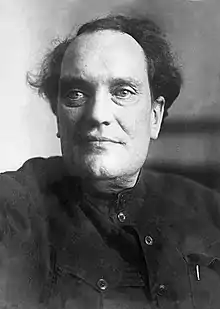 |
Valerian Kuybyshev (1888–1935) |
14 May 1934 | 25 January 1935 † | 256 days | Vyacheslav Molotov | Chairman of the Soviet Control Commission | [4][5] |
| 2 | 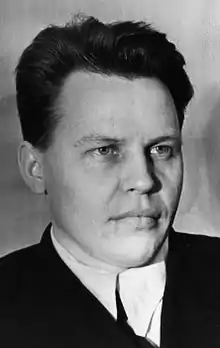 |
Nikolai Voznesensky (1895–1950) |
10 March 1941 | 15 March 1946 | 5 years, 5 days | Vyacheslav Molotov Joseph Stalin |
Chairman of the State Planning Commission | [6] |
| 3 | 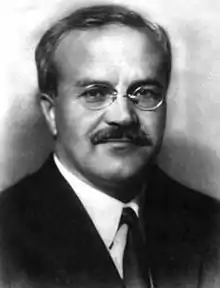 |
Vyacheslav Molotov (1890–1986) |
16 August 1942 | 29 June 1957 | 11 years, 106 days | Joseph Stalin Georgy Malenkov Nikolai Bulganin |
Minister of Foreign Affairs | [7][8] |
| 4 | 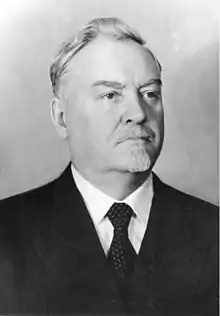 |
Nikolai Bulganin (1895–1975) |
7 April 1950 | 8 February 1955 | 4 years, 307 days | Joseph Stalin Georgy Malenkov |
Minister of Defence | [9][10] |
| 5 | _(cropped).jpg.webp) |
Lavrentiy Beria (1899–1953) |
5 March 1953 | 26 June 1953 | 113 days | Georgy Malenkov | Minister of Internal Affairs | [11] |
| 6 | 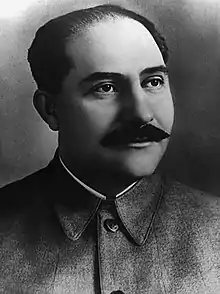 |
Lazar Kaganovich (1893–1991) |
5 March 1953 | 29 June 1957 | 4 years, 141 days | Georgy Malenkov Nikolai Bulganin Nikita Khrushchev |
Minister of Building Materials Industry Chairman of the State Committee of the Council of Ministers for Labour and Wages |
[12][13] [14] |
| 7 | 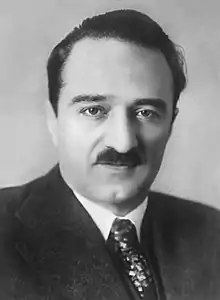 |
Anastas Mikoyan (1895–1978) |
28 February 1955 | 15 July 1964 | 9 years, 138 days | Nikolai Bulganin Nikita Khrushchev |
— |
[15] |
| 8 | .jpg.webp) |
Mikhail Pervukhin (1904–1974) |
28 February 1955 | 5 July 1957 | 2 years, 127 days | Nikolai Bulganin | Chairman of the State Economic Commission on Current Economic Planning | [16] |
| 9 | Maksim Saburov (1900–1977) |
28 February 1955 | 5 July 1957 | 2 years, 127 days | Nikolai Bulganin | Chairman of the State Planning Committee | [17] | |
| 10 | Joseph Kuzmin (1910–1996) |
28 February 1955 | 5 July 1957 | 2 years, 127 days | Nikolai Bulganin | Chairman of the State Planning Committee | [18] | |
| 11 | Frol Kozlov (1908–1965) |
31 March 1958 | 4 May 1960 | 2 years, 34 days | Nikita Khrushchev | Chairman of the State Planning Committee | [19] | |
| 12 | 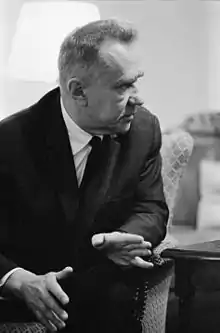 |
Alexei Kosygin (1904–1980) |
4 May 1960 | 15 October 1964 | 4 years, 164 days | Nikita Khrushchev | — |
[20] |
| 13 | .jpg.webp) |
Dmitriy Ustinov (1908–1984) |
13 March 1963 | 26 March 1965 | 2 years, 13 days | Nikita Khrushchev Alexei Kosygin |
— |
[21] |
| 14 | Kirill Mazurov (1914–1989) |
26 March 1965 | 28 November 1978 | 13 years, 247 days | Alexei Kosygin | First Secretary of the Communist Party of Byelorussia | [22] | |
| 15 | Dmitry Polyansky (1917–2001) |
2 October 1965 | 2 February 1973 | 7 years, 123 days | Alexei Kosygin | — |
[23] | |
| 16 | Nikolai Tikhonov (1905–1997) |
2 September 1976 | 23 October 1980 | 4 years, 51 days | Alexei Kosygin | — |
[24] | |
| 17 | Ivan Arkhipov (1907–1998) |
27 October 1980 | 4 October 1986 | 5 years, 342 days | Nikolai Tikhonov Nikolai Ryzhkov |
— |
[25] | |
| 18 |  |
Heydar Aliyev (1923–2003) |
24 November 1982 | 23 October 1987 | 4 years, 333 days | Nikolai Tikhonov Nikolai Ryzhkov |
First Secretary of the Azerbaijan Communist Party | [26][27] |
| 19 | .jpg.webp) |
Andrei Gromyko (1909–1989) |
24 March 1983 | 2 July 1985 | 2 years, 100 days | Nikolai Tikhonov | Minister of Foreign Affairs | [28][29] |
| 20 | Nikolai Talyzin (1929–1991) |
14 October 1985 | 1 October 1988 | 2 years, 353 days | Nikolai Ryzhkov | Chairman of the State Planning Committee | [30] | |
| 21 | Vsevolod Murakhovski (1926–2017) |
1 November 1985 | 7 June 1989 | 3 years, 218 days | Nikolai Ryzhkov | Chairman of the State Committee of the Council of Ministers for Agriculture | [31] | |
| 22 | .jpg.webp) |
Yuri Maslyukov (1937–2010) |
5 February 1988 | 26 December 1990 | 2 years, 324 days | Nikolai Ryzhkov | Chairman of the State Planning Committee | [32][33] |
| 23 | Lev Voronin (1928–2006) |
17 July 1989 | 26 December 1990 | 1 year, 162 days | Nikolai Ryzhkov | — |
[34] | |
| 24 | Vladilen Nikitin (born 1936) |
27 July 1989 | 30 August 1990 | 1 year, 34 days | Nikolai Ryzhkov | — |
[35] | |
| 25 | Vladimir Velichko (born 1937) |
15 January 1991 | 26 November 1991 | 315 days | Valentin Pavlov Ivan Silayev |
Minister of Heavy Machine Building | [36][37] | |
| 26 | Vitaly Doguzhiyev (1935–2016) |
15 January 1991 | 26 November 1991 | 315 days | Valentin Pavlov Ivan Silayev |
— |
[37] | |
| 27 |  |
Vladimir Shcherbakov (born 1949) |
16 May 1991 | 26 November 1991 | 194 days | Valentin Pavlov Ivan Silayev |
— |
[37] |
See also
Notes
- These numbers are not official.
References
- Huskey, Eugene (1992). Executive Power and Soviet Politics: The Rise and Decline of the Soviet State. M.E. Sharpe. ISBN 1-56324-059-9.
- Кабинет Министров СССР. 5 июля 1978 «ЗАКОН О СОВЕТЕ МИНИСТРОВ СССР». (Supreme Soviet of the Soviet Union. 5 July 1978 Law of the Council of Ministers of the USSR. ).
- Zemtsov, Ilya (1989). Chernenko: The Last Bolshevik: The Soviet Union on the Eve of Perestroika. New Brunswick, N.J: Transaction Publishers. p. 119. ISBN 0-88738-260-6.
- Shepilov, Dmitri; Austin, Anthony; Bittner, Stephen (2007). The Kremlin's Scholar: A Memoir of Soviet Politics under Stalin and Khrushchev. Yale University Press. p. 403. ISBN 978-0-300-09206-6.
- Hollander, Paul (2006). From the Gulag to the Killing Fields: Personal Accounts of Political Violence and Repression in Communist States. ISI Books. p. 113. ISBN 1-932236-78-3.
- McCauley, Martin (1997). Who's Who in Russia since 1900. Routledge. pp. 224–225. ISBN 0-415-13898-1.
- Phillips, Steven (2000). Lenin and the Russian Revolution. Heinemann. p. 89. ISBN 0-435-32719-4.
- Ulam, Adam (2007). Stalin: The Man and his Era. Tauris Parke Paperbacks. p. 508. ISBN 978-1-84511-422-0.
- Trahair, R.C.S. (2004). Encyclopedia of Cold War Espionage, Spies, and Secret Operations. Greenwood Publishing Group. p. 69. ISBN 0-313-31955-3.
- Siddiqi, Asif Azam (2010). The Red Rockets' Glare: Spaceflight and the Soviet Imagination, 1857–1957. Cambridge University Press. p. 266. ISBN 978-0-521-89760-0.
- Service, Robert (2009). History of Modern Russia: From Tsarism to the Twenty-first Century. Penguin Books Ltd. p. 332. ISBN 978-0-14-103797-4.
- Rogovin, Vadim Zakharovich (2009). Stalin's Terror of 1937–1938: Political Genocide in the USSR. Mehring Books. p. 332. ISBN 978-1-893638-04-4.
- McCauley, Martin (1997). Who's Who in Russia since 1900. Routledge. p. 106. ISBN 0-415-13898-1.
- McAuley, Alastair (1979). Economic Welfare in the Soviet Union: Poverty, Living standards, and Inequality. University of Wisconsin Press. p. 2000. ISBN 0-04-335038-0.
- Микоян Анастас Иванович [Anastas Ivanovich Mikoyan] (in Russian). War Heroes. Retrieved 12 January 2011.
- Первухин, Михаил Георгиевич [G. Pervukhin, Mikhail] (in Russian). War Heroes. Retrieved 12 January 2011.
- Сабуров, Максим Захарович [Maksim Zakharovich Saburov] (in Russian). hrono. Archived from the original on 16 May 2011. Retrieved 12 January 2011.
- Государственная власть СССР: Высшие органы власти и управления и их руководители: 1923—1991 [The state power of the USSR: Higher authorities and governments and their leaders: 1923–1991]. Moscow, Russian Federation: Историко-биографический справочник./Сост. В. И. Ивкин. 2004. p. 69. ISBN 978-5-8243-0014-7.
- Staff writer. Фрол Романович КОЗЛОВ [Frol Romanovich Kozlov] (in Russian). proekt-wms.narod.ru. Retrieved 12 January 2011.
- Trahair, R.C.S. (2004). Encyclopedia of Cold War Espionage, Spies, and Secret Operations. Greenwood Publishing Group. p. 37. ISBN 0-313-31955-3.
- Staff writer. Устинов, Дмитрий Фёдорович [Ustinov, Dmitry Fedorovich] (in Russian). warheroes.ru. Retrieved 12 January 2011.
- Staff writer. Мазуров Кирилл Тимофеевич [Kirill Trofimovich Mazurov] (in Russian). hrono.ru. Retrieved 12 January 2011.
- Staff writer. Полянский, Дмитрий Степанович [Polyansky, Dmitry Stepanovich] (in Russian). Pseudology. Retrieved 12 January 2011.
- Ploss, Sidney (2010). The Roots of Perestroika: The Soviet Breakdown in Historical Context. McFarland & Company. p. 219. ISBN 978-0-7864-4486-1.
- Ziyang, Zhao; Bao, Pu; Chiang, Renee (1998). Prisoner of the State: The Secret Journal of Zhao Ziyang. Routledge. p. 289. ISBN 1-4391-4938-0.
- Staff writer (16 December 2003). "Azerbaijan's Geidar Aliev dies at 80". China Daily. Retrieved 12 January 2011.
- Eastern Europe and the Commonwealth of Independent States. Routledge. 1998. p. 156. ISBN 1-85743-058-1.
- Ploss, Sidney (2010). The Roots of Perestroika: The Soviet Breakdown in Historical Context. McFarland & Company. p. 217. ISBN 978-0-7864-4486-1.
- Laird, Robin F., Hoffmann, Erik P.; Fleron, Fredrick J. (1991). Soviet Foreign Policy: Classic and Contemporary Issues. Transaction Publishers. pp. 445–46. ISBN 0-202-24171-8.CS1 maint: multiple names: authors list (link)
- Staff writer (26 January 1991). "Nikolai Talyzin, 62; Assisted Gorbachev in Starting Reforms". The New York Times. Reuters. Retrieved 12 January 2011.
- Staff writer. "Всеволод Серафимович Мураховский" [Vsevolod Seraphimovich Murakhovski]. portrets.ru. Retrieved 13 February 2011.
- Staff writer (1 April 2010). "Скончался депутат Госдумы от КПРФ Юрий Маслюков" [Yuri Maslyukov, a Communist Party State Duma Deputy dies]. Gazeta.ru. Retrieved 13 February 2011.
- Маслюков Юрий Дмитриевич [Yuri Dmitriyevich Maslyukov] (in Russian). hrono. Retrieved 13 February 2011.
- Staff writer. Воронин, Лев Алексеевич [Voronin, Lev Alekseyevich] (in Russian). moscow-tombs.narod.ru. Archived from the original on 10 July 2012. Retrieved 8 April 2011.
- Abrosimov, Igor. Н – Свод персоналий [H – Set of personalities] (in Russian). proza.ru. Retrieved 13 February 2011.
- Schulz-Torge, Ulrich-Joachim (1992). Who Was Who in the Soviet Union. K. G. Saur Verlag. p. 232. ISBN 978-3-598-10810-5.
- Shevchenko, Iulia (2004). The Central Government of Russia: From Gorbachev to Putin. Ashgate Publishing. p. 32. ISBN 978-0-7546-3982-4.
